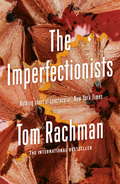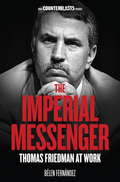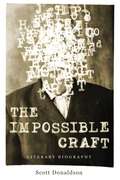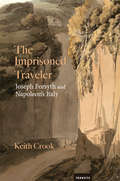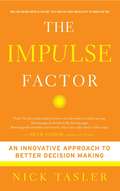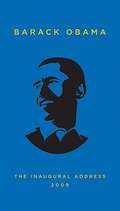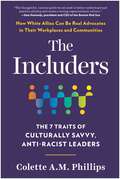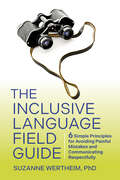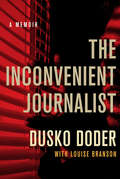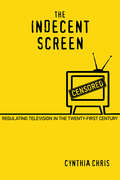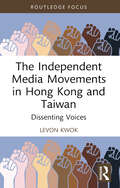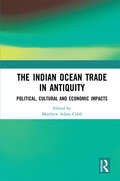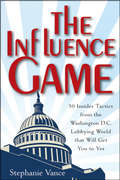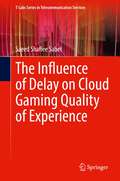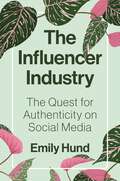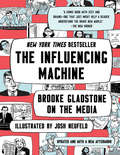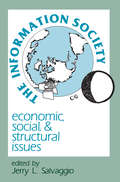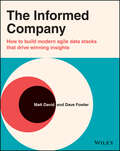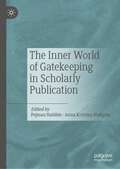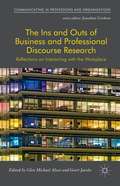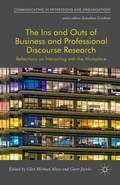- Table View
- List View
The Imperfect Mirror: Inside Stories of Television Newswomen
by Daniel PaisnerReflecting the views of television's top newswomen, The Imperfect Mirror provides a tough look at what it takes to come a long way. Here are the inside stories of women who are overcoming the last obstacles in what has long been a male- dominated industry, along with their candid opinions about the men running their newsrooms, sexism on the job, and how much better than their male colleagues they have to be to get and stay ahead. Diane Sawyer, Lesley Stahl, Mary Alice Williams, Marlene Sanders, Jane Pauley. The women in this book continue to light the way for others to shine in the imperfect mirror of broadcast news. They come from all over the country, from our smallest local television markets to the big-three networks, and they offer frank insight on their first career steps, on the cosmetic aspects of their jobs, on Christine Craft's sex-discrimination suit against KMBC-TV, on the pregnancy of an unmarried Boston anchorwoman (and their own--very public--pregnancies), and on the constant push and pull of their personal and professional lives. They discuss the ways in which they bring the latest-breaking events to the airwaves, as well as what the future holds for all women in the workplace. In a series of six day-in-the-life profiles--ranging from anchorwoman Chere Avery of WBBH-TV in Fort Myers, Florida, our 101st largest television market, to Connie Chung of NBC News--The Imperfect Mirror also offers a broad-brush portrait of working television newswomen, and takes an inside look at the nitty-gritty business of covering the news on a daily basis. Television newswomen have indeed come a long way since the days of the adorned weathergirl and singing spokes- model. "But the fact is," writes author Daniel Paisner, "the doors of television newsrooms opened a lot faster than the minds of the men who worked inside.... There is still a clear difference between newsmen and newswomen, between anchormen and anchorwomen, between the jobs they are asked to do and the public's perception of what those jobs are and what goes into them. There is a difference in salary, there is a difference in opportunities, there is a difference in balance, there is a difference in influence, and there is a difference in expectations."
The Imperfectionists: A Novel
by Tom RachmanThe charming and enthralling story of an idiosyncratic English-language newspaper in Rome and the lives of its staffers as the paper fights for survival in the internet age.'A precise, playful fiction with a deep but lightly worn intelligence' - Times Literary SupplementThe newspaper was founded in Rome in the 1950s, a product of passion and a multi-millionaire's fancy. Over fifty years, its eccentricities earned a place in readers' hearts around the globe. But now, circulation is down, the paper lacks a website, and the future looks bleak. Still, those involved in the publication seem to barely notice. The obituary writer is too busy avoiding work. The editor-in-chief is pondering sleeping with an old flame. The obsessive reader is intent on finishing every old edition, leaving her trapped in the past. And the publisher seems less interested in his struggling newspaper than in his magnificent basset hound, Schopenhauer. The Imperfectionists interweaves the stories of eleven unusual and endearing characters who depend on the paper. Funny and moving, the novel is about endings - the end of life, the end of sexual desire, the end of the era of newspapers - and about what might rise afterward.
The Imperial Messenger: Thomas Friedman at Work (Counterblasts)
by Belen FernandezFactual errors, ham-fisted analysis, and contradictory assertions--compounded by a penchant for mixed metaphors and name-dropping--distinguish the work of Pulitzer Prize-winning New York Times columnist and author Thomas Friedman. The Imperial Messenger reveals the true value of this media darling, a risible writer whose success tells us much about the failures of contemporary journalism. Belén Fernández dissects the Friedman corpus with wit and journalistic savvy to expose newsroom practices that favor macho rhetoric over serious inquiry, a pacified readership over an empowered one, and reductionist analysis over integrity.The Imperial Messenger is polemic at its best, relentless in its attack on this apologist for American empire and passionate in its commitment to justice.About the series: Counterblasts is a new Verso series that aims to revive the tradition of polemical writinginaugurated by Puritan and leveller pamphleteers in the seventeenth century, when in the wordsof one of them, Gerard Winstanley, the old world was "running up like parchment in the fire."From 1640 to 1663, a leading bookseller and publisher, George Thomason, recorded that hiscollection alone contained over twenty thousand pamphlets. such polemics reappeared bothbefore and during the French, Russian, Chinese and Cuban revolutions of the last century.In a period of conformity where politicians, media barons and their ideologicalhirelings rarely challenge the basis of existing society, it's time to revive the tradition.Verso's Counterblasts will challenge the apologists of Empire and Capital.
The Impossible Craft: Literary Biography (Penn State Series in the History of the Book)
by Scott DonaldsonIn The Impossible Craft, Scott Donaldson explores the rocky territory of literary biography, the most difficult that biographers try to navigate. Writers are accustomed to controlling the narrative, and notoriously opposed to allowing intruders on their turf. They make bonfires of their papers, encourage others to destroy correspondence, write their own autobiographies, and appoint family or friends to protect their reputations as official biographers. Thomas Hardy went so far as to compose his own life story to be published after his death, while falsely assigning authorship to his widow. After a brief background sketch of the history of biography from Greco-Roman times to the present, Donaldson recounts his experiences in writing biographies of a broad range of twentieth-century American writers: Ernest Hemingway, F. Scott Fitzgerald, John Cheever, Archibald MacLeish, Edwin Arlington Robinson, Winfield Townley Scott, and Charlie Fenton. Donaldson provides readers with a highly readable insiders’ introduction to literary biography. He suggests how to conduct interviews, and what not to do during the process. He offers sound advice about how closely biographers should identify with their subjects. He examines the ethical obligations of the biographer, who must aim for the truth without unduly or unnecessarily causing discomfort or worse to survivors. He shows us why and how misinformation comes into existence and tends to persist over time. He describes “the mythical ideal biographer,” an imaginary creature of universal intelligence and myriad talents beyond the reach of any single human being. And he suggests how its very impossibility makes the goal of writing a biography that captures the personality of an author a challenge well worth pursuing.
The Impossible H. L. Mencken: A Selection of His Best Newspaper Stories
by H. L. MenckenA collection of newspaper articles written by Mencken over the course of his long and distinguished career.
The Imprisoned Traveler: Joseph Forsyth and Napoleon's Italy (Transits: Literature, Thought & Culture 1650-1850)
by Keith CrookThe Imprisoned Traveler is a fascinating portrait of a unique book, its context, and its elusive author. Joseph Forsyth, traveling through an Italy plundered by Napoleon, was unjustly imprisoned in 1803 by the French as an enemy alien. Out of his arduous eleven-year “detention” came his only book, Remarks on Antiquities, Arts, and Letters during an Excursion in Italy (1813). Written as an (unsuccessful) appeal for release, praised by Forsyth’s contemporaries for its originality and fine taste, it is now recognized as a classic of Romantic period travel writing. Keith Crook, in this authoritative study, evokes the peculiar miseries that Forsyth endured in French prisons, reveals the significance of Forsyth’s encounters with scientists, poets, scholars, and ordinary Italians, and analyzes his judgments on Italian artworks. He uncovers how Forsyth’s allusiveness functions as a method of covert protest against Napoleon and reproduces the hitherto unpublished correspondence between the imprisoned Forsyth and his brother. Published by Bucknell University Press. Distributed worldwide by Rutgers University Press.
The Impulse Factor: Why Some of Us Play It Safe and Others Risk It All
by Nick TaslerIn his work as research and development director at cutting-edge think tank TalentSmart, where he helps businesses work better and employees think smarter, Nick Tasler realized that the recent discovery by scientists of a potential-seeking gene could have a remarkable impact on how we understand decision making. Those who have this gene -- about one quarter of the population -- are endowed with impulsive tendencies that can lead to fast and decisive action or to foolish choices. The cautious majority that Tasler calls risk managers can make carefully considered decisions or become hopelessly lost in the fog of details. Now The Impulse Factor offers readers a unique online opportunity to analyze their own decision-making style and harness it to improve their everyday lives. Each book comes with access to a proprietary assessment developed specifically to evaluate impulsivity. With examples from business, psychology, and Tasler's own research at TalentSmart, the book also vividly illustrates how susceptible we are to the events around us and how our reactions often run contrary to our best interests. By combining his research with real-world examples of extreme decision making, Tasler teaches readers how to thrive when faced with difficult choices. More than just a book, The Impulse Factor provides a clear understanding of why you make the choices you do -- and the tools to make those decisions change your business and your life.
The Inaugural Address 2009
by Barack ObamaCelebrate the inauguration of America's 44th president with this New York Times bestseller Tying into the official theme for the 2009 inaugural ceremony, "A New Birth of Freedom" from Lincoln's Gettysburg Address, Penguin presents a keepsake edition commemorating the inauguration of President Barack Obama with words of the two great thinkers and writers who have helped shape him politically, philosophically, and personally: Abraham Lincoln and Ralph Waldo Emerson. Having Lincoln and Emerson's most influential, memorable, and eloquent words along with Obama's historic inaugural address will be a gift of inspiration for every American for generations to come. .
The Includers: The 7 Traits of Culturally Savvy, Anti-Racist Leaders
by Colette A.M. PhillipsLearn to be a leader who is not simply &“against racism,&” but who actively advocates for diversity, equity, and inclusion as an anti-racist ally. It&’s a simple fact that the people who make policy and oversee government, sports, business, and the arts and entertainment are most commonly white men. Another fact: We cannot achieve meaningful progress if we exclude the very people who have the power to make systemic change. This easy-to-read handbook is free of any attempts to shame, blame, or guilt leaders for the choices they made in the past or privileges they were born with. Instead, readers will learn to view the work they do through a racial equity lens so they can easily and immediately begin making changes. In The Includers, Colette Phillips explores the core qualities that inclusive leaders share: character, cultural intelligence, connections, communications, collaboration, courage, and commitment. With humor and poignance, and backed by research, Phillips shares stories of real Includers: the CEOs, politicians, and public figures—all white male allies—she&’s admired, known, and, in some cases, counseled. For leaders who are ready to do their part and get beyond today&’s &“anti-woke&” rhetoric, this eye-opening guide demonstrates the business imperative of diversity, equity, and inclusion and offers practical, actionable insights from allies and advocates who are willing to listen, learn, and &“lead from behind&” to create sustainable systemic change.
The Inclusive Language Field Guide: 6 Simple Principles for Avoiding Painful Mistakes and Communicating Respectfully
by Suzanne WertheimAvoid inadvertently offending or alienating anyone by following six straightforward communication guidelines developed by a no-nonsense linguistic anthropologist and business consultant.In today's fast-moving and combative culture, language can feel like a minefield.Terms around gender, disability, race, sexuality and more are constantly evolving. Words that used to be acceptable can now get you cancelled. People are afraid of making embarrassing mistakes. Or sounding outdated or out of touch. Or not being as respectful as they intended.But it's not as complicated as it might seem. Linguistic anthropologist Suzanne Wertheim offers six easy-to-understand principles to guide any communication-written or spoken-with anyone:Reflect realityShow respectDraw people inIncorporate other perspectivesPrevent erasureRecognize pain pointsThis guide clarifies the challenges-and the solutions-to using "they/them," and demonstrates why "you guys" isn't as inclusive as many people think. If you follow the principles, you'll know not to ask a female coworker with a wedding ring about her husband-because she might be married to a woman. And you'll avoid writing things like "America was discovered in 1492," because that's just when Europeans found it.Filled with real-world examples, high-impact word substitutions, and exercises that boost new skills, this book builds a foundational toolkit so people can evaluate what is and isn't inclusive language on their own.
The Inconvenient Journalist: A Memoir
by Dusko DoderIn The Inconvenient Journalist, Dusko Doder, writing with his spouse and journalistic partner Louise Branson, describes how one February night crystalized the values and personal risks that shaped his life. The frigid Moscow night in question was in 1984, and Washington Post correspondent Doder reported signs that Soviet leader Yuri Andropov had died. The CIA at first dismissed the reporting, saying that "Doder must be smoking pot." When Soviet authorities confirmed Andropov's death, journalists and intelligence officials questioned how a lone reporter could scoop the multibillion-dollar US spy agency. The stage was set for Cold War-style revenge against the star journalist, and that long night at the teletype machine in Moscow became a pivotal moment in Doder's life. After emigrating to the United States from Yugoslavia in 1956, Doder committed himself to the journalist's mission. He knew that reporting the truth could come at a price, something driven home by his years of covering Soviet dissidents and watching his Washington Post colleagues break the Watergate story. Still, he was not prepared for a cloaked act of reprisal from the CIA. Taking aim at Doder, the CIA insinuated a story into Time magazine suggesting that he had been coopted by the KGB. Doder's professional world collapsed and his personal life was shaken as he fought Time in court. In The Inconvenient Journalist, Doder reflects on this attempt to destroy his reputation, his dedication to reporting the truth, and the vital but precarious role of the free press today. The Inconvenient Journalist is a powerful human story and a must-read for all concerned about freedom of the press and truthful reporting.
The Indecent Screen: Regulating Television in the Twenty-First Century
by Cynthia ChrisThe Indecent Screen explores clashes over indecency in broadcast television among U.S.-based media advocates, television professionals, the Federal Communications Commission, and TV audiences. Cynthia Chris focuses on the decency debates during an approximately twenty-year period since the Telecommunications Act of 1996, which in many ways restructured the media environment. Simultaneously, ever increasing channel capacity, new forms of distribution, and time-shifting (in the form of streaming and on-demand viewing options) radically changed how, when, and what we watch. But instead of these innovations quelling concerns that TV networks were too often transmitting indecent material that was accessible to children, complaints about indecency skyrocketed soon after the turn of the century. Chris demonstrates that these clashes are significant battles over the role of family, the role of government, and the value of free speech in our lives, arguing that an uncensored media is so imperative to the public good that we can, and must, endure the occasional indecent screen.
The Independent Media Movements in Hong Kong and Taiwan: Dissenting Voices (Routledge Focus on Asia)
by Levon KwokThis book examines the independent media movements by Inmediahk and Coolloud – long-established, autonomous media organizations that have agitated for the development of media freedom and human rights in Hong Kong and Taiwan since 2004 and 1997, respectively. Based on direct interviews with the founders and core members of Inmediahk and Coolloud, the author investigates the origins, growth, and achievements of Inmediahk and Coolloud's media social movements as well as the current challenges the two independent media outlets encounter with regard to funding, increasing socio-political pressure, and the complicated media environments in Hong Kong and Taiwan using the method of qualitative content interpretation. Moreover, the practicality of social media and independent media in contemporary social movements, including the 2019 Anti-Extradition Bill Movement in Hong Kong, is reviewed according to text analysis. Considering the prospect of media activism from a non-western perspective, this book will appeal not only to scholars and researchers with interests in media, social movement, and cultural studies, but also to media workers and activists across the globe.
The Indian Ocean Trade in Antiquity: Political, Cultural and Economic Impacts
by Matthew Adam CobbThe period from the death of Alexander the Great to the rise of the Islam (c. late fourth century BCE to seventh century CE) saw a significant growth in economic, diplomatic and cultural exchange between various civilisations in Africa, Europe and Asia. This was in large part thanks to the Indian Ocean trade. Peoples living in the Roman Empire, Parthia, India and South East Asia increasingly had access to exotic foreign products, while the lands from which they derived, and the peoples inhabiting these lands, also captured the imagination, finding expression in a number of literary and poetic works. The Indian Ocean Trade in Antiquity provides a range of chapters that explore the economic, political and cultural impact of this trade on these diverse societies, written by international experts working in the fields of Classics, Archaeology, South Asian studies, Near Eastern studies and Art History. The three major themes of the book are the development of this trade, how consumption and exchange impacted on societal developments, and how the Indian Ocean trade influenced the literary creations of Graeco-Roman and Indian authors. This volume will be of interest not only to academics and students of antiquity, but also to scholars working on later periods of Indian Ocean history who will find this work a valuable resource.
The Indian Periodical Press and the Production of Nationalist Rhetoric
by Sukeshi KamraConsiders the Indian periodical press as a key forum for the production of nationalist rhetoric. It argues that between the 1870s and 1910, the press was the place in which the notion of 'the public' circulated and where an expansive middle class, and even larger reading audience, was persuaded into believing it had force.
The Influence Game
by Stephanie VanceGet what you want, every time!Imagine a world where you are offered every job you seek; every business venture you undertake is successful; and every potential customer you approach buys your product. Now imagine that all of this can be achieved--ethically and honestly. All you need is the help of one battle-tested guide, The Influence Game. Former Washington, D.C. lobbyist Stephanie Vance dispenses everything she's learned about effective (and, believe it or not, honest) persuasion. Learn how to apply this power to any situation by using D.C. insider influence strategies and applying a step-by-step, easy-to-understand process for success. Learn how to develop and articulate effective goalsStructure both long and short-term persuasion effortsIdentify and research primary and secondary audiencesCrafting those all important personal storiesStephanie Vance has seen the influence game from every angle. Follow her lead to get past being heard to the real goal of being agreed with.
The Influence of Delay on Cloud Gaming Quality of Experience (T-Labs Series in Telecommunication Services)
by Saeed Shafiee SabetThis book provides an understanding of the impact of delay on cloud gaming Quality of Experience (QoE) and proposes techniques to compensate for this impact, leading to a better gaming experience when there are network delays. The author studies why some games in the cloud are more delay sensitive than others by identifying game characteristics influencing a user's delay perception and predicting the gaming QoE degraded by the delay. The author also investigates the impact of jitter and serial-position effects on gaming QoE and delay. Using the insight gained, the author presents delay compensation techniques that can mitigate the negative influence of delay on gaming QoE that use the game characteristics to adapt the games.
The Influencer Industry: The Quest for Authenticity on Social Media
by Emily HundA critical history of the social media influencer&’s rise to global prominenceBefore there were Instagram likes, Twitter hashtags, or TikTok trends, there were bloggers who seemed to have the passion and authenticity that traditional media lacked. The Influencer Industry tells the story of how early digital creators scrambling for work amid the Great Recession gave rise to the multibillion-dollar industry that has fundamentally reshaped culture, the flow of information, and how we relate to ourselves and each other.Drawing on dozens of in-depth interviews with leading social media influencers, brand executives, marketers, talent managers, trend forecasters, and others, Emily Hund shows how early industry participants focused on creating and monetizing digital personal brands as a means of exerting control over their professional destinies in a time of acute economic uncertainty. Over time, their activities coalesced into an industry whose impact has reached far beyond the dreams of its progenitors—and beyond their control. Hund illustrates how the methods they developed for creating, monetizing, and marketing social media content have permeated our lives and untangles the unforeseen cultural and economic costs.The Influencer Industry reveals how, in an increasingly fractured and profit-driven communications environment, the people we think of as &“real&” are merely those who have learned to exploit the industry&’s ever-shifting constructions of authenticity.
The Influencing Machine (Updated Edition): Brooke Gladstone On The Media
by Josh Neufeld Brooke GladstoneNew York Times Bestseller With a New Afterword “A comic book with zest and brains—one that just might help a reader understand the brave new world.” —The New Yorker A million listeners trust NPR’s Brooke Gladstone to guide them through the complexities of the modern media. Bursting onto the page in vivid comics by acclaimed artist Josh Neufeld, this brilliant radio personality guides us through two millennia of media history, debunking the notion that “The Media” is an external force beyond our control and equipping us to be savvy consumers and shapers of the news. An invaluable introduction to how the media works from one of the acknowledged masters of the industry, this tenth anniversary edition brings the story up to date, with new illustrations and an afterword that offers a deep examination of the rise of social media and the public’s responsibility in a time of division and disinformation.
The Influential Conversationalist
by Jen MuellerSitting at your desk and hoping someone notices your efforts doesn’t work as a career development strategy. Talking does. That’s why you need tools to become an Influential Conversationalist. Your talent and know-how will be the best kept secret without the ability to communicate those skills to others. Are you talking enough to get to where you really want to be in your career? <p><p> Here’s what you’ll discover as an Influential Conversationalist – daily interactions develop leadership potential. Follow the strategies outline by veteran sports broadcaster Jen Mueller and you’ll be able to: • Showcase your accomplishments and display confidence • Develop a fan base at work that raises your profile and influence • Communicate in a way that makes your conversations more effective • Make yourself available for bigger opportunities <p> Jen developed the Influential Conversationalist approach after nearly two decades in professional sports locker rooms. Her workplace conversations require the ability to communicate in high leverage, real-time situations during live interviews with athletes from diverse backgrounds. She’ll give you a different take on how to approach business communication.
The Information Society: Economic, Social, and Structural Issues (Routledge Communication Series)
by Jerry L. SalvaggioFirst Published in 1989. Routledge is an imprint of Taylor & Francis, an informa company.
The Informed Company: How to Build Modern Agile Data Stacks that Drive Winning Insights
by Dave Fowler Matthew C. DavidLearn how to manage a modern data stack and get the most out of data in your organization! Thanks to the emergence of new technologies and the explosion of data in recent years, we need new practices for managing and getting value out of data. In the modern, data driven competitive landscape the "best guess" approach—reading blog posts here and there and patching together data practices without any real visibility—is no longer going to hack it. The Informed Company provides definitive direction on how best to leverage the modern data stack, including cloud computing, columnar storage, cloud ETL tools, and cloud BI tools. You'll learn how to work with Agile methods and set up processes that's right for your company to use your data as a key weapon for your success . . . You'll discover best practices for every stage, from querying production databases at a small startup all the way to setting up data marts for different business lines of an enterprise. In their work at Chartio, authors Fowler and David have learned that most businesspeople are almost completely self-taught when it comes to data. If they are using resources, those resources are outdated, so they're missing out on the latest cloud technologies and advances in data analytics. This book will firm up your understanding of data and bring you into the present with knowledge around what works and what doesn't. Discover the data stack strategies that are working for today's successful small, medium, and enterprise companies Learn the different Agile stages of data organization, and the right one for your team Learn how to maintain Data Lakes and Data Warehouses for effective, accessible data storage Gain the knowledge you need to architect Data Warehouses and Data Marts Understand your business's level of data sophistication and the steps you can take to get to "level up" your data The Informed Company is the definitive data book for anyone who wants to work faster and more nimbly, armed with actionable decision-making data.
The Inner World of Gatekeeping in Scholarly Publication
by Pejman Habibie Anna Kristina HultgrenThis edited book focuses on the certifiers of scientific knowledge, bringing together experts in a variety of areas in Applied Linguistics to address the complex topic of editing and reviewing in writing for scholarly publication. Drawing on insider perspectives, the authors bring to the fore personal histories, narratives and first-hand accounts of editors and reviewers and help paint a richer and more nuanced picture of the discourses, practices, experiences, success stories, failures, and challenges that frame and shape trajectories of both Anglophone and English as an additional language (EAL) scholars in adjudicating and accrediting academic output. This book will be of interest to researchers, practitioners, supervisors, writing mentors, early-career scholars and graduate students in a variety of fields.
The Ins and Outs of Business and Professional Discourse Research: Reflections on Interacting with the Workplace (Communicating In Professions And Organizations)
by Glen Michael Alessi Geert JacobsThe Ins and Outs of Business and Professional Discourse Research.
The Ins and Outs of Business and Professional Discourse Research: Reflections on Interacting with the Workplace (Communicating in Professions and Organizations)
by Glen Michael Alessi Geert JacobsWinner of the Association for Business Communication’s Distinguished Publication on Business Communication Award 2016This edited volume offers a collection of original chapters focusing on the Ins and Outs of professional discourse research. Drawing on insights from LSP, ethnography and discourse analysis, it covers a wide range of issues, ranging from gaining access and collecting data to feeding results back in the form of recommendations to practitioners.

